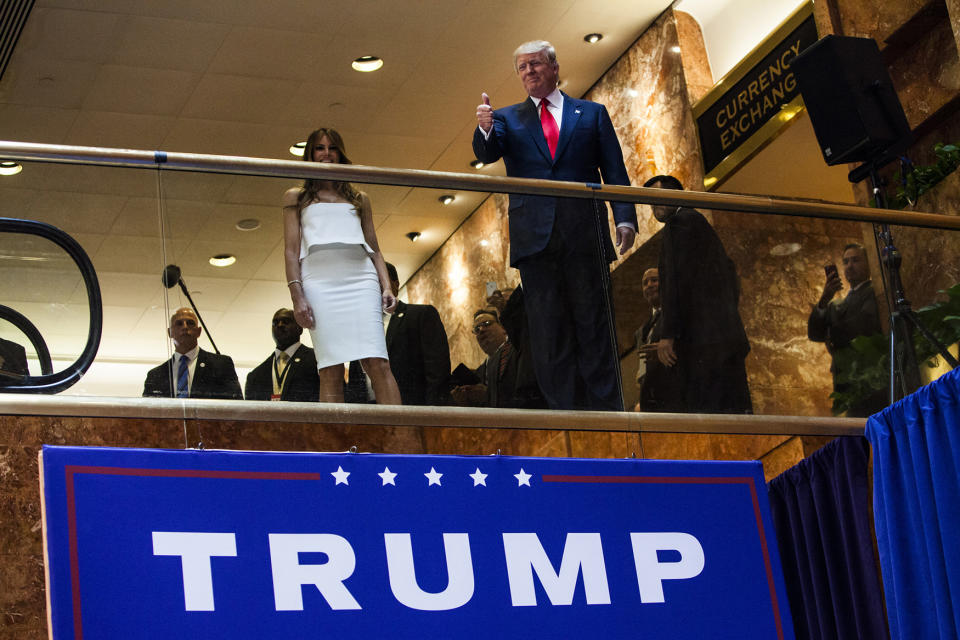Mr. Trump’s wild ride: Insiders dish on the early days of the campaign that shook America
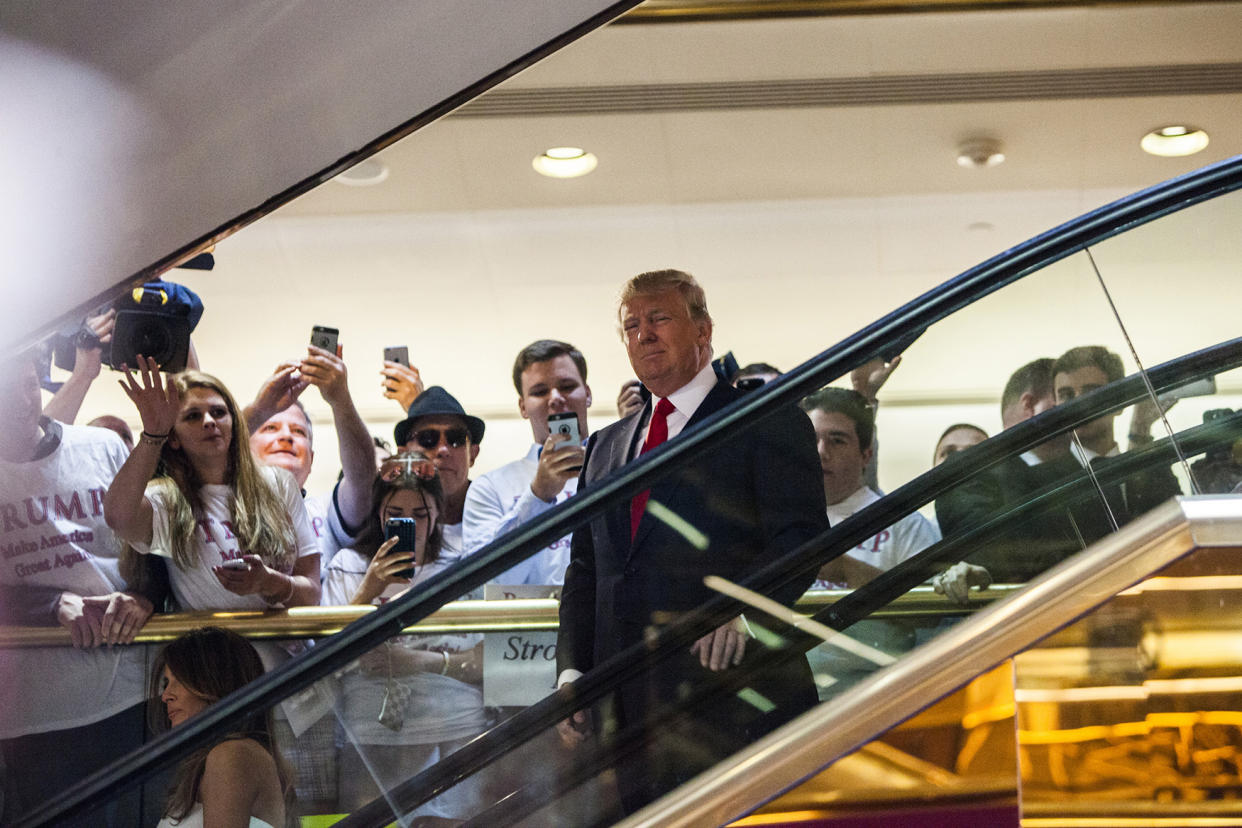
Leading up to Donald Trump’s presidential campaign announcement, his inner circle was arguing about whether it needed balloons, models and even a live elephant.
Some members of Trump’s team wanted the event to be an over-the-top spectacle that would say in the loudest way possible: This is a different kind of candidate. Trump’s then-campaign manager, Corey Lewandowski, fought them and pushed to make the launch more traditional.
In the end, there were no circus animals — but the June 2015 campaign kickoff at Trump Tower was hardly a typical political affair. The real estate mogul and reality television star made a grand entrance on his gilded escalator, a ride that became an iconic image of his White House bid. But perhaps the most memorable and controversial part of the launch was Trump’s fiery announcement speech, in which he accused the Mexican government of sending criminals and “rapists” over the border. Yet according to every source Yahoo News spoke with — in an extensive series of interviews with top staffers from the early days of the campaign — Trump’s comments about Mexican immigrants weren’t part of his prepared speech. They were, rather, an early sign of his proclivity for provocative ad-libs that would become one of the hallmarks of his presidential bid.
The staffers describe a campaign that from the first day was a wild and combustible mix of outrageous showmanship and behind-the-scenes backstabbing, as well as a losing effort to keep the unpredictable candidate on message.
Trump’s announcement went through at least five major drafts and edits that resulted in a tightly prepared script with no mention of rape. But, according to Lewandowski, the “vast majority” of the speech Trump actually delivered was spontaneous and unscripted.
“That speech was going to last seven minutes and 28 seconds — I think it was originally timed in at,” Lewandowski said. “His announcement speech ended up clocking in somewhere north of 45 minutes.”
Roger Stone, Trump’s longtime confidant and former campaign adviser, described the comments about Mexican immigrants being “rapists” and criminals as “riffing.”
“If you go watch the video you can see that, in the beginning, he’s working off of a prepared text, which is pretty solid,” Stone said of Trump. “Then he departs from the prepared text and that’s where you got, you know, the Mexicans coming across the border and bringing drugs, they’re bringing crime and so on.”
Sam Nunberg, another ex-adviser, echoed this assessment of Trump’s inflammatory rhetoric about undocumented Mexican immigrants.
“That was just Donald going off the cuff. He never used prepared remarks,” said Nunberg.
Trump’s comments caused a backlash that included several companies and individuals severing ties with him. In a legal deposition given in June of this year for one of two lawsuits he filed against chefs who backed out of a deal to operate a restaurant at one of his hotels, Trump was asked if his remarks were planned “in advance.”
“Yes,” Trump said.
Trump, who was making the case that his business partners should not have been scandalized by his comments, conceded he had not told anyone else about his plans for the speech. Still, his insistence that the remarks were not ad-libbed is hard to square with his advisers’ version of events. But these types of blatant contradictions are par for the course in the turbulent world of Trump Tower, where the candidate has earned a reputation for constantly stretching the truth, and his team has engaged in intense infighting. The Trump campaign declined to comment on this story.
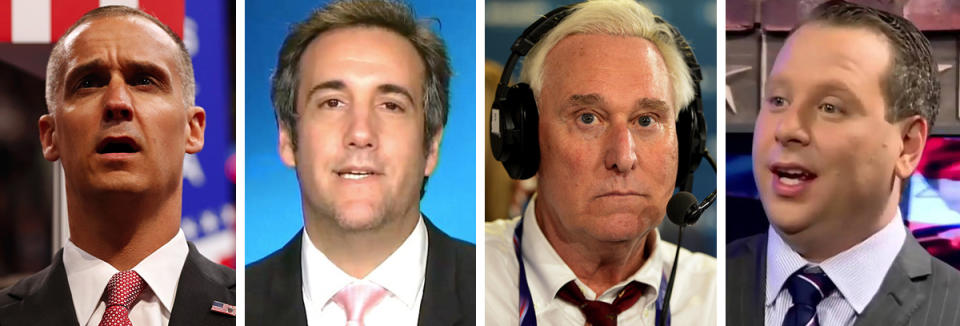
The 16 months since Trump stepped off that escalator have been a bumpy ride. Trump has gone through two more campaign managers since firing Lewandowski in June, just over a year after he launched his candidacy. The interviews involved a dizzying array of conflicting stories, back-and-forth personal attacks and accusations of double-crossing. This charged atmosphere makes it hard to separate fact from fiction in Trump’s creation myth.
The alleged “announcement elephant” is a perfect example of the difficulty inherent in uncovering Trump’s history.
One faction, including Stone, wanted to stage a deliberately outrageous campaign kickoff for a testosterone-charged blue-collar base that they believed could be won over by an infusion of adrenaline in politics. Stone believed they couldn’t have Trump “standing at the podium for a regular press conference.”
“We needed to make a splash, and we needed to not look like a conventional politician,” Stone explained.
It was also a chance to thumb their noses at the political and media elites, who had all been extremely dismissive of Trump up until that point.
“I would have had confetti, balloons. I would have had clowns, women in bikinis handing out Donald Trump shirts,” Nunberg recounted. “It was going to be the WWF Smashmouth — like, most glorious disgusting event of all time to turn politics upside down. It was the f*** you of f*** yous to the establishment.”
Lewandowski, a former New Hampshire police officer with a no-nonsense buzzcut and a similarly clipped speaking style, hoped to stick to more standard operating procedures. He advocated for something that “looked professional … that people were going to take seriously because we were being knocked as not being a serious candidate.”
“It was definitely other people who thought confetti and balloons and a spectacle would be something, and I didn’t agree with that idea,” he said.
Stone and Nunberg both said Trump’s longtime lawyer, Michael Cohen, was eager to put on an extravaganza.
“Corey and Michael Cohen were fighting constantly over stupid things — you know, balloons and signs,” said Stone.
Nunberg said Cohen planned to draw on his experience as a native of the Five Towns, a Jewish enclave on Long Island.
“Michael Cohen said, ‘I could do this. I plan the best bar mitzvahs,’ which was the exact mindset we needed,” Nunberg explained in a conversation with Yahoo News.
Some in the Trump campaign believed Cohen was serious when he suggested a circus animal. Cohen insisted he brought it up in jest.
“I was horsing around. … I said to Mr. Trump, ‘Do you think that the floors could handle a 5,000-pound elephant?’ It was a joke,” he said.
Cohen, who has spent almost a decade with Trump and has a reputation for fierce loyalty, attributed his wilder ideas about the announcement to excitement at seeing his boss launch a campaign.
The staffers’ recollections also differ about how the audience was assembled for the campaign kickoff. Shortly after Trump’s announcement, Angelo Carusone, a liberal blogger and anti-Trump activist, published a blog post citing evidence the campaign hired actors to augment the crowd. The Hollywood Reporter subsequently found an email from a casting agency offering actors $50 each to cheer Trump’s speech.
Stone accused Cohen of being responsible for packing the audience with actors. He implied it was a needlessly embarrassing move because Trump ended up drawing a healthy crowd anyway.
“Cohen went out and hired people to fill the hall. Little did he know that that would be unnecessary,” Stone scoffed.
Cohen called Stone’s claim “completely false.”
“The only people who were paid were approximately a dozen aides whose sole function was to escort Republican groups arriving by bus from Long Island and the suburbs, with T-shirts, banners, and escorting them into the building,” Cohen said.
The disputes over the announcement event were small skirmishes among many battles fought by the early members of Trump’s team. Some of the most bitter feuding involved Nunberg, Stone and Lewandowski. All three men are no longer with the campaign and have engaged in vicious rounds of finger-pointing since their departures.
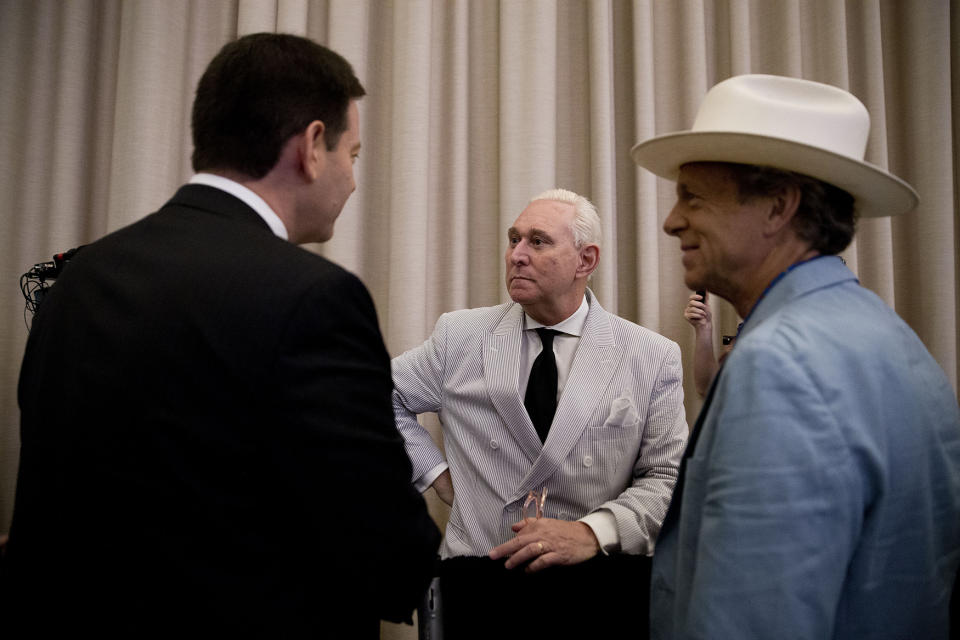
Trump’s political operation essentially started with Stone, a man who prides himself on maintaining an immaculate appearance and a decidedly dirty reputation. Stone revels in his fame as a master of dark arts and dirty tricks. He has plied his trade for a long list of unsavory and outlandish clients, including Philippines dictator Ferdinand Marcos and Kristin Davis, the so-called Manhattan Madam, who turned to politics after running a high-priced prostitution ring. Starting in the late ’80s, Stone worked as a lobbyist for Trump’s casinos, and he later consulted on several of Trump’s political dalliances.
Nunberg entered the picture in 2010, when Stone was in the midst of one of his typically outrageous political schemes. Stone was helping Davis in New York’s gubernatorial race on the pro-marijuana, pro-prostitution “Anti-Prohibition” line while simultaneously being in, as he put it, “constant contact” with one of her Republican opponents. Nunberg, who was just under 30 at the time, approached Stone with some ideas.
“He comes on a bit strong, as you know,” Stone said of Nunberg. “I mean, within a week of my meeting him he was going around telling people I was his mentor. He’s got chutzpah, as they say.”
The brash Nunberg, who speaks with a New York accent in streams of juicy gossip and maxims gleaned from the memoirs of political strategists, made an odd couple with the meticulous Stone. But they developed a strong rapport with Trump. Nunberg likened the arrangement to a law firm where Trump was the client, Stone was a named partner and he was an associate handling the day-to-day business for Trump’s account and trying to shoehorn actual proposals into the candidate’s infamously freewheeling speeches.
“He has the Donald Trump ‘variety show,’ and we fit in the policy,” Nunberg said.
According to Stone, Nunberg wrote strategy memos, speeches, press releases and even some of Trump’s tweets.
“There was nobody else. I mean, for almost two years he carried the torch of Trump for president. He was the guy out there arguing with everybody in the party that Trump could win,” Stone said of Nunberg. “Sam alone was out there as a true believer, and he got Donald to be more conversant with issues.”
Nunberg even claims credit for Trump’s signature policy proposal — the wall on America’s southern border with Mexico.
“I created the wall with Roger,” Nunberg recounted. “The reason, and I’ll tell you this, the reason we did the wall — Roger and I discussed it in 2014 — was it was hard to get Donald to talk about policy.”
Stone isn’t so sure about this.
“Sometimes Sam will tell you that he thought of the wall,” Stone said. “Other times he’ll tell you Trump thought of the wall. I don’t really know who thought of the wall.”
Nunberg said Trump was mostly interested in doing his “variety show,” which included tales from his career as a real estate magnate and commentary on current events. He believed the wall was one of the only policy plans Trump was eager to discuss because it allowed him to tout his experience as a developer, and it lent itself to a favorite slogan.
“He would always talk about the wall because, guess what? As he made up, ‘Nobody builds like Trump,’” said Nunberg.
Though Nunberg helped build Trump’s political brand, he only made it through the first six weeks of the campaign. Nunberg was fired in early August 2015 after this reporter published a story in Business Insider that revealed racially charged Facebook posts he made between 2007 and 2009. The posts, which Nunberg said he did not recall writing, were initially revealed on a Friday. Lewandowski announced Nunberg’s dismissal on Sunday and called multiple reporters to ensure they heard the news. Both Nunberg and Stone think Lewandowski played a role in Nunberg’s ouster.
“He was jealous of Sam’s relationship [with Trump], and he’s a little Hitler,” Stone said of Lewandowski. “He likes everybody to say yes to him. Sam was not afraid to tell Corey he was full of s***. Corey hated that.”
Lewandowski insisted he “only wanted to do what was in my mind best for the campaign” and criticized Nunberg’s behavior and performance.
“They believe that that was some Machiavellian deal where I had this whole thing planned,” Lewandowski said. “Look, personally, on a personal level, Sam Nunberg’s the kind of guy I could go out and hang out with. … He’s a good guy. I think he’s got some issues, honestly.”
One Trump source who is currently with the campaign at a high level said Nunberg’s departure had a huge impact.
“I was really crestfallen when Sam got blown off the campaign, by the way. I think that was a real speed bump for Trump,” said the source, who requested anonymity owing to the nondisclosure agreements the candidate requires staffers to sign. “I think Trump took a while to get his sea legs because he didn’t have a real speechwriter. He didn’t have a guy that did policy. Sam was kind of that guy.”
Stone left the campaign less than a week after Nunberg. Depending on who’s speaking, Stone was either fired or quit after disagreements over strategy. Lewandowski was fired as campaign manager on June 20, just a little more than a year after Trump’s announcement. His ouster came amid rumors of power struggles with Trump’s daughter Ivanka and her husband, Jared Kushner, who has been a key adviser.
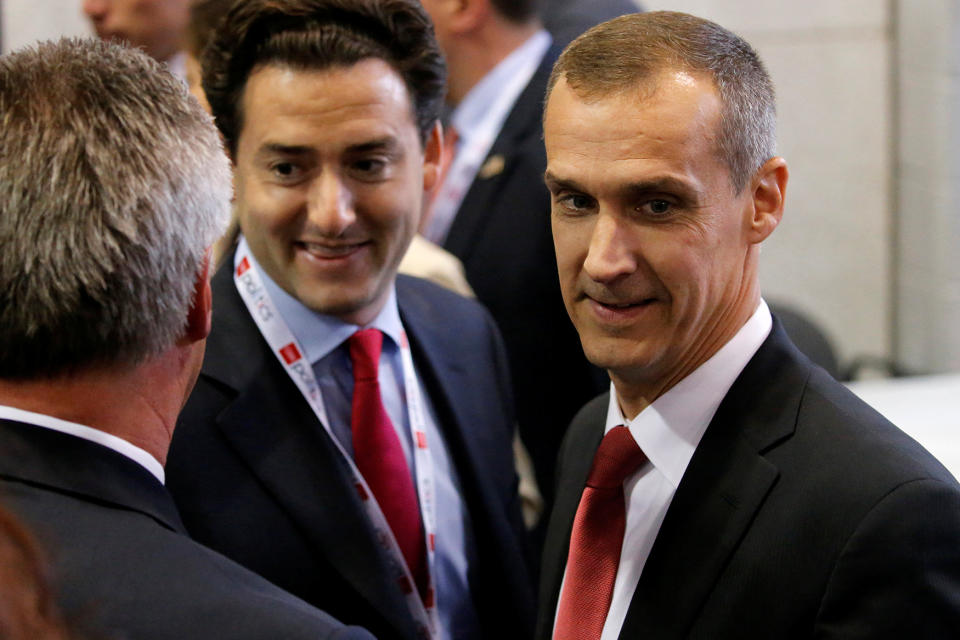
Both Lewandowski and Stone remain in the Trump orbit. Stone is currently spearheading an effort to identify “election fraud,” a project that Democrats have labeled a pro-Trump voter intimidation effort. As of August, Lewandowski was still on the Trump campaign payroll for “strategy consulting.” He’s also a CNN contributor and is one of Trump’s most ardent advocates on cable news. Nunberg has not stayed on such good terms with the real estate mogul. In May, Trump filed a $10 million legal claim in private arbitration against Nunberg for allegedly violating his nondisclosure agreement by making disparaging comments and leaking information to reporters. Nunberg claimed Trump accused him of planting an unflattering newspaper item about Lewandowski and another campaign staffer. Trump and Nunberg reached a confidential settlement.
Even with their clashes and conflicting memories, there was one thing about the announcement event that all the early Trump staffers who talked to Yahoo News agreed on: Stone, Nunberg, Lewandowski and Cohen all said the escalator ride was Trump’s idea.
“Initially, I suggested Mr. Trump enter via the elevator, bringing him straight down to the atrium level. My rationale for suggesting this was solely for security purposes,” Cohen explained. “Mr. Trump rejected that plan.”
Both Lewandowski and Cohen attributed Trump’s desire to take the escalator ride to his eagerness to see the supporters who came to cheer him on. The speech took place in the pink marble atrium at the base of Trump Tower. It was filled with press and VIPs, while the larger crowds were on the balconies above. Taking the escalator allowed Trump to point and wave at his supporters in the lobby while he slowly rode past with his wife, Melania. Their entrance was soundtracked by the hard-charging guitars of Neil Young’s “Rockin’ in the Free World.”
Cohen said Trump was “adamant” about taking the escalator.
“I’m going down the escalator. End of story,” Trump said, according to Cohen.
The announcement event may not have had an elephant or bikini models, but for Stone and Nunberg, Trump’s escalator ride was enough to set it apart.
“We needed the drama of coming down the staircase,” Stone said.
Nunberg agreed.
“Like, who the hell comes down the escalator with his model wife in that dress and Neil Young? How awesome was that?” Nunberg said.
Now, with only four days left until the election, Trump is narrowly trailing Democrat Hillary Clinton. While Lewandowski praised the current leadership of the Trump’s team, Nunberg and Stone both expressed dismay about the way the campaign has unfolded since their departures. Stone kept his specific critiques close to the vest.
“I’m not looking to pick a fight here, but … this is not my campaign and it’s not the campaign I would have run,” said Stone. “That said, I’ve done everything I can to be supportive of the campaign and, in those instances when I disagree, I basically have kept my mouth shut.”
Nunberg argued Trump has become too focused on attacking Clinton, her supporters and his political enemies rather than articulating a positive policy message.
“He went from Obama to Stalin,” Nunberg said of Trump. “It went from aspirational, positive, a message of opportunity, ‘Yes, we’re angry, but we have the opportunity and potential to fix it.’ … Then it just, you know, it just went further and further [as] he strayed from it.”
